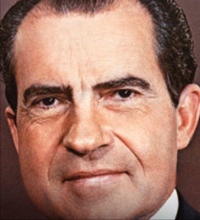Republicans are fond of comparing their scandal-mongering -- like the current hype over the terrorist assault on the U.S. consulate in Benghazi, Libya -- with genuine scandals, like Watergate, which sank Richard Nixon's second term, and Iran-Contra, which marred Ronald Reagan's last two years in office.
The GOP false equivalence represents both an effort to puff up their latest accusations against Democrats and an attempt to minimize the misconduct of those two Republican presidents. For instance, one favorite GOP comment about Benghazi is: "No one died at Watergate. Four brave Americans died in Benghazi."
The answers seem to be that the Benghazi consulate had evolved into a CIA base for secret operations and that U.S. intelligence didn't want to tip off the attack's perpetrators regarding how much the agency knew about their identities. So, the word "extremists" replaced specific groups and the CIA affiliation of two slain Americans was withheld.This apples-and-oranges sophistry misses the point that Watergate and Iran-Contra were complex conspiracies that required intensive investigations to unravel their secrets (many of which remain hidden or in dispute to this day) while the Benghazi affair boils down to an easily resolved question as to why the U.S. intelligence community withheld some of the details in the immediate aftermath of the attack last Sept. 11.
By contrast, the history of Watergate is still substantially misunderstood even by supposed experts. Evidence from the National Archives now indicates that Nixon's Watergate operation linked back to his 1968 campaign's sabotage of President Lyndon Johnson's Vietnam peace talks, an operation that Johnson privately called "treason."
As I explain in my new book, America's Stolen Narrative, Johnson had learned, in the days before Election 1968, that Nixon's campaign was keeping the South Vietnamese away from the Paris talks. LBJ even confronted Nixon by phone just two days before the election. Nixon denied any skullduggery but Johnson didn't believe him.
Nixon's campaign feared that if Johnson did achieve a Vietnam peace breakthrough, which was then in the offing, Vice President Hubert Humphrey would likely win the election, consigning Nixon to another bitter defeat.
There was also the possibility that if Johnson went public with what he knew about the Nixon campaign's interference with the negotiations -- while a half million American troops were in the Vietnam war zone and more than 30,000 had already died -- the disclosure might put Humphrey over the top.
But Johnson's advisers feared what might happen to the country's unity if Nixon's maneuver were revealed and he still went on to victory. They foresaw a dangerously weakened president and national disorder. As Defense Secretary Clark Clifford told Johnson in a conference call:
"Some elements of the story are so shocking in their nature that I'm wondering whether it would be good for the country to disclose the story and then possibly have a certain individual [Nixon] elected. It could cast his whole administration under such doubt that I think it would be inimical to our country's interests."
So, Johnson kept quiet; Nixon narrowly won the election; and the Paris peace talks remained stalled for the remainder of LBJ's presidency. Johnson's only revenge was to order his national security aide Walt Rostow to remove from the White House the file of "top secret" wiretap transcripts and other evidence of Nixon's gambit when Johnson's term ended on Jan. 20, 1969. Rostow labeled the file "The "X' Envelope."
Hoover's Tip
Early in his presidency, Nixon received unsettling news from FBI Director J. Edgar Hoover about how much Johnson knew about the Vietnam peace sabotage. Hoover described a widespread wiretapping operation against Nixon's campaign. Hoover apparently overstated the extent of the actually wiretapping, but the report unnerved Nixon.
Nixon ordered his top assistants, White House chief of staff H.R. Haldeman and National Security Adviser Henry Kissinger, to track down the file, which they discovered was missing. They managed to reconstruct much of what had been in the file but they didn't know where the original documents had gone.
The missing file became a sudden crisis for Nixon in mid-June 1971 when the New York Times began publishing the Pentagon Papers, a secret history of the Vietnam War from 1945 to 1967, which exposed many of the lies behind the war, mostly told by Democrats.
However, as the Pentagon Papers dominated the front pages of U.S. newspapers in June 1971, Nixon understood something that few others did -- that there was a shocking sequel to the Pentagon Papers, a secret file explaining how Nixon had torpedoed Johnson's peace talks in 1968 and thus extended the war for several more years.
In other words, there was a file that could doom Nixon's reelection in 1972 -- or possibly worse, result in his impeachment and even his prosecution. Nixon had not only continued the war, with the hope of getting his South Vietnamese allies a better deal than Johnson would have given them, but he had escalated the war with an invasion of Cambodia in 1970.
Beyond the unspeakable bloodshed in Indochina, the United States had been torn apart domestically with parents turning on their children, with massive street protests against the war, and with four American students slain at Kent State in Ohio and two at Jackson State in Mississippi.
(Note: You can view every article as one long page if you sign up as an Advocate Member, or higher).






